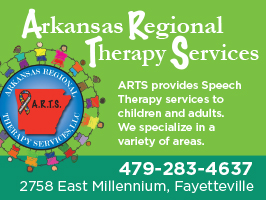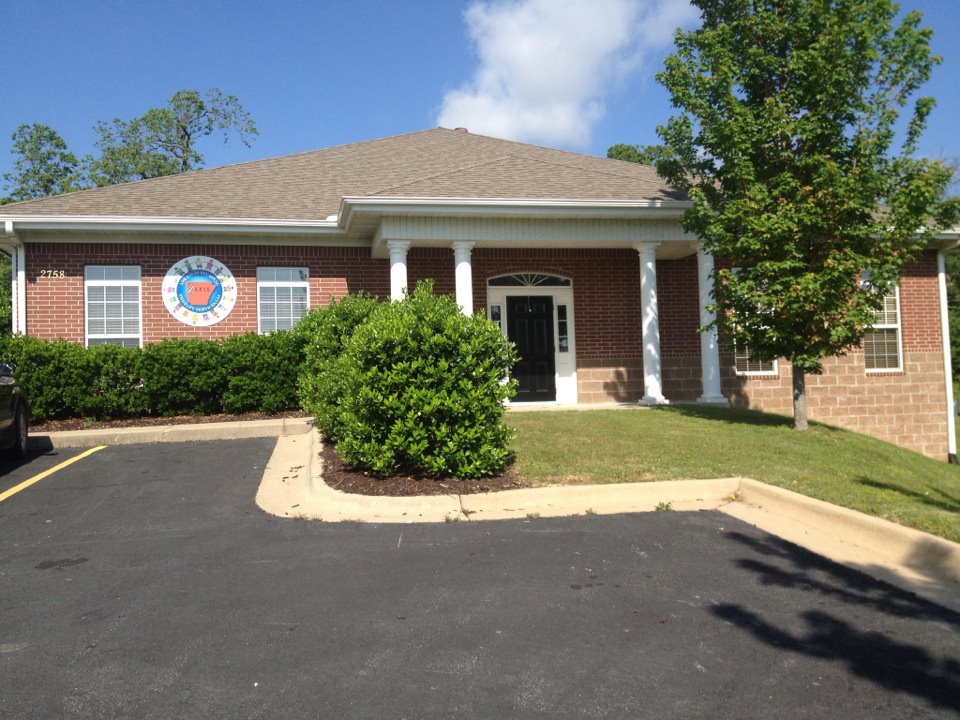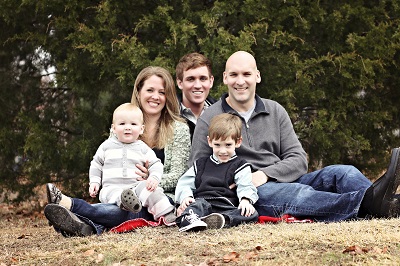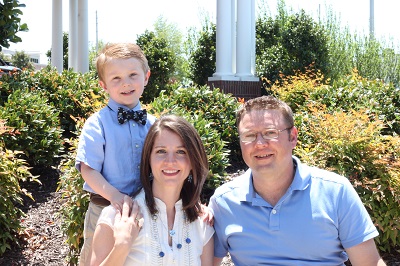We met Kristy Brown, co-founder of Arkansas Regional Therapy Services, soon after we started Motherlode in 2008.
We were immediately impressed with her bubbly personality and passion for her vocation as a speech therapist. When one of our kids received services at ARTS for a while we were able to see Kristy and her business partner, Tara Call, in action. They rock at making learning and “work” seem like one big party for their clients — kids and adults.
We are thrilled to introduce you to Kristy and Tara through a quick-read Q&A:
What prompted you to start Arkansas Regional Therapy Services: We’ve been friends since early on in our undergraduate studies. After graduating with our masters we both began as Speech Language Pathologists in the public school system. After gaining valuable experience in the schools we both decided to pursue practicing as a speech therapist in private practice. Tara began practicing privately in 2006, and Kristy joined her in 2009. Both Tara and Kristy have a strong desire to provide the highest quality services in their clients.
What are some of the unique services you offer at your offices? The therapy world is always changing. As therapists we are always furthering our education and skills. Our clinic is able to cater to the following speech and language needs:
All language delays, articulations delays, hearing impairments, feeding and swallowing, tongue thrust, reading and writing deficits and social skills.
We use techniques from the following methods: applied behavior analysis (ABA), TEACCH, PROMPT, Pivotal Response Training (PRT), and Bechman Oral Motor Method.
We also offer beginning sign language coaching lessons for parents and caregivers, including child care providers. After school hours, we offer social skills groups and programs to encourage social development in children and teens.
We also have a reading/writing specialist and academic tutor on staff.
Tell us about the ARTS therapists: Our therapists are so wonderful and such blessings! We select therapists that have proven their skill level by providing direct treament under the supervision and guidance (of Tara and Kristy). It is actually part of the interview process for us. Each therapist has been supervised to ensure the highest quality treatment is overed to each individual we serve.
ARTS is also affiliated with the University of Arkansas in accepting interns to train under us to help our community gain qualified and experienced Speech Language Pathologists.
Do you test for autism and offer therapy at the clinic? A speech pathologist/ therapist is part of a diagnostic team that can diagnose Autism. As the Speech Language Pathologist on the team we are responsible for evaluating the many aspects of language for an individual who may be diagnosed with Autism. These areas include: receptive and expressive language, pragmatics (social language), inferencing and perspective taking.
Once diagnosed with Autism, we treat the symptoms. Language (expressive, receptive, and social language) is an area that is crucial to address with Autism. We like to say “we don’t treat the diagnosis, we treat the child”.
Many times we see a child months or a year or so before they are diagnosed with Autism. The diagnosis does not change our plan of treatment, it just broadens the horizon when looking for funding that is helpful to the child and family.
Do you have any free screenings coming up? We are always doing something for the community in regards to screening and testing. Any parent is welcome to call and speak to us about their concerns! After that initial conversation it is often determined if the child needs to come in for further evaluation. We also offer free hearing screenings throughout the year to anyone in the community. Please check our Facebook page and webpage/blog for the announcements!
 Tell us what a speech therapist actually does: Of course I will give you the long answer, sorry (from ASHA.org)!
Tell us what a speech therapist actually does: Of course I will give you the long answer, sorry (from ASHA.org)!
A speech-language pathologist is responsible for the diagnosis, prognosis, prescription, and remediation of speech, language, and swallowing disorders. A speech-language pathologist evaluates and treats children and adults who have difficulty speaking, listening, reading, writing, or swallowing. The overall objective of speech-language pathology services is to optimize individuals’ ability to communicate and swallow, thereby improving quality of life.
American Speech-Language-Hearing Association
Speech-language pathologists, as defined by ASHA, hold the ASHA Certificate of Clinical Competence in Speech-Language Pathology (CCC-SLP). Minimal criteria to become an SLP include:
- Master’s, doctoral, or other recognized post-baccalaureate degree. from a program accredited by the Council on Academic Accreditation in Audiology and Speech-Language Pathology (CAA);
- At least 25 hours of supervised clinical observation and 350 hours of supervised clinical practicum involving evaluation and treatment of children and adults with communication disorders;
- Successfully passing a national examination in speech-language pathology; and
- Completion of a clinical fellowship after completion of the graduate degree that consists of at least 36 weeks of full-time professional experience or its part-time equivalent.
- Demonstration of continued professional development is mandated for the maintenance of the CCC-SLP. Where applicable, speech-language pathologists hold other required credentials (e.g., state licensure, teaching certification).
You treat adults, too, right? Our clinic does treat adults and we help with a wide range of speech language needs. Currently, we are offering the following therapy for adults: accent reduction, feeding and swallowing, exective functioning and socials skills.
What are some red flags that might prompt parents to bring their children in for testing? We are big fans of developmental checklists to give a parent a guideline. ASHA.org is a great resource for these. A few guidelines to keep in mind:
Age one: should be saying several one word utterances and able to attempt to repeat words after adults. They may not be clear and have all of the sounds right, but an attempt is great!
Age 2: they should start to put two words together and be labeling everything, using inflection to ask questions such as “daddy go?”.
Age 3: your child should be speaking so that you can understand him/ her and strangers as well.
Remember, ages listed means “through that age”….give your child time. We offer classes for parents that feel their child could use a boost but don’t qualify for therapy.
If I could tell parents one thing, it would be to not be reactive but proactive when it comes to speech and language. An evaluation is harmless and the children love the one on one play time!
On a side note, qualifications for therapy will depend on the realm of your provider. For instance, to qualify in the public sector (school system), your scores have to be within a qualifying range and affect their education. In the private sector we are able to accept scores that are even just one point below normal and this allows us to be very proactive in treatment. Please, always seek a second opinion from a private therapist if the public system feels you do not qualify.
Tell us a little about your family:
Tara: I am the mother of 3 active boys ages 19, 5 and 16 months. I’m married to my best friend who is a teacher in the public schools and a college basketball official. We enjoy spending time together, alone away from the hustle and bustle, just relaxing. We all pitch in with the chores, gardening and cooking to keep our household organized and happy while both of us enjoy our full time jobs serving our community.
Kristy: I am married to Greg Brown, an attorney, and we have one son, John Lleyton, who will be turning five this summer. We have pets and love to spend time as a family together generally just relaxing. My husband is an avid hunter so I am famous for being a “Hunter’s Widow” in the fall and winter. I do enjoy wild game cooking and eating of course! As a family we also enjoy gardening, local entertainment/events, and traveling.
When you’re not working, what do you enjoy doing?
Tara: I enjoy spending time with my husband and boys taking care of our home. We love experiencing the outdoors in Northwest Arkansas.
Kristy: I enjoy gardening, camping, traveling, reading,the farmers market, and research (I know, nerdy). A girls’ night out is fun too! Most of all I enjoy FAMILY TIME!
We know you love your job. What’s your favorite thing about it?
Kristy: I would have to say my absolute favorite part of the job are the personal rewards I get every day. This may be a child giving me eye contact for the first time, watching a child sign “more” to ask for more tickles, hearing a child say Mama, or teaching a child to answer, “what is your name?”. I also can’t forget the fact that I feel like I am making a difference in someone every day!
Tara: Seeing progress in my clients, most definitely!
Click here to visit the ARTS website and learn more about services that are available to children and adults in Northwest Arkansas. Or call 479-283-4637 for more info! Kristy and Tara are happy to chat with you.








